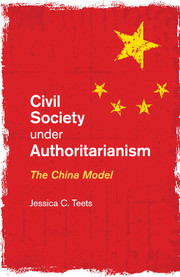Crossref Citations
This Book has been
cited by the following publications. This list is generated based on data provided by Crossref.
2014.
Books Received.
The China Quarterly,
Vol. 220,
Issue. ,
p.
1181.
Hensengerth, Oliver
2015.
Multi-Level Governance: The Missing Linkages.
Vol. 4,
Issue. ,
p.
295.
Lagerkvist, Johan
2015.
The Unknown Terrain of Social Protests in China: ‘Exit', ‘Voice', ‘Loyalty', and ‘Shadow’.
Journal of Civil Society,
Vol. 11,
Issue. 2,
p.
137.
Shih, Chih-yu
and
Yu, Po-tsan
2015.
Post-Western International Relations Reconsidered.
p.
75.
Chengzhong, Pu
2015.
Breaking Rules to be Compassionate: The ‘Skillful Means’ of Buddhist Relief after the Wenchuan Earthquake Disaster.
International Journal of Mass Emergencies & Disasters,
Vol. 33,
Issue. 1,
p.
118.
Smith, David H.
Stebbins, Robert A.
Grotz, Jurgen
Kumar, Pradeep
Nga, Janice L. H.
and
Puyvelde, Stijn Van
2016.
The Palgrave Handbook of Volunteering, Civic Participation, and Nonprofit Associations.
p.
90.
Hsu, Becky
2016.
The ‘Impossible’ Default: Qualitative Data on Borrower Responses to Two Types of Social-Collateral Microfinance Structures in Rural China.
The Journal of Development Studies,
Vol. 52,
Issue. 1,
p.
147.
Dau, Magnus
and
Bräuer, Stephanie
2016.
Continuity and Change in China’s Civic Engagement from a ‘State in Society’ Perspective.
VOLUNTAS: International Journal of Voluntary and Nonprofit Organizations,
Vol. 27,
Issue. 5,
p.
2021.
Smith, David Horton
and
Zhao, Ting
2016.
Review and Assessment of China’s Nonprofit Sector after Mao.
Voluntaristics Review,
Vol. 1,
Issue. 5,
p.
1.
Simon, Karla W.
Breen, Oonagh B.
Avtonomov, Alexey
Dadrawala, Noshir
Hasan, Samiul
and
Smith, David H.
2016.
The Palgrave Handbook of Volunteering, Civic Participation, and Nonprofit Associations.
p.
1139.
Kwon, Kyae Lim
and
Hanlon, Robert J.
2016.
A comparative review for understanding elite interest and climate change policy in China.
Environment, Development and Sustainability,
Vol. 18,
Issue. 4,
p.
1177.
Gåsemyr, Hans Jørgen
2016.
Networks and campaigns but not movements: collective action in the disciplining Chinese State.
Journal of Civil Society,
Vol. 12,
Issue. 4,
p.
394.
Balzer, Harley
and
Askonas, Jon
2016.
The Triple Helix after communism: Russia and China compared.
Triple Helix,
Vol. 3,
Issue. 1,
Ziegler, Charles E.
2016.
Great powers, civil society and authoritarian diffusion in Central Asia.
Central Asian Survey,
Vol. 35,
Issue. 4,
p.
549.
Wong, Natalie W. M.
2016.
Environmental protests and NIMBY activism: Local politics and waste management in Beijing and Guangzhou.
China Information,
Vol. 30,
Issue. 2,
p.
143.
Tai, John W.
2016.
Predicting China’s political future: the risky business of betting against the Chinese Communist Party.
Critical Asian Studies,
Vol. 48,
Issue. 4,
p.
605.
Steinhardt, H. Christoph
and
Wu, Fengshi
2016.
In the Name of the Public: Environmental Protest and the Changing Landscape of Popular Contention in China.
The China Journal,
Vol. 75,
Issue. ,
p.
61.
Wu, Fengshi
and
Yang, Shen
2016.
Web 2.0 and Political Engagement in China.
VOLUNTAS: International Journal of Voluntary and Nonprofit Organizations,
Vol. 27,
Issue. 5,
p.
2055.
Zhao, Rong
Wu, Zhongsheng
and
Tao, Chuanjin
2016.
Understanding Service Contracting and Its Impact on NGO Development in China.
VOLUNTAS: International Journal of Voluntary and Nonprofit Organizations,
Vol. 27,
Issue. 5,
p.
2229.
Yu, Zhiyuan
2016.
The Effects of Resources, Political Opportunities and Organisational Ecology on the Growth Trajectories of AIDS NGOs in China.
VOLUNTAS: International Journal of Voluntary and Nonprofit Organizations,
Vol. 27,
Issue. 5,
p.
2252.





